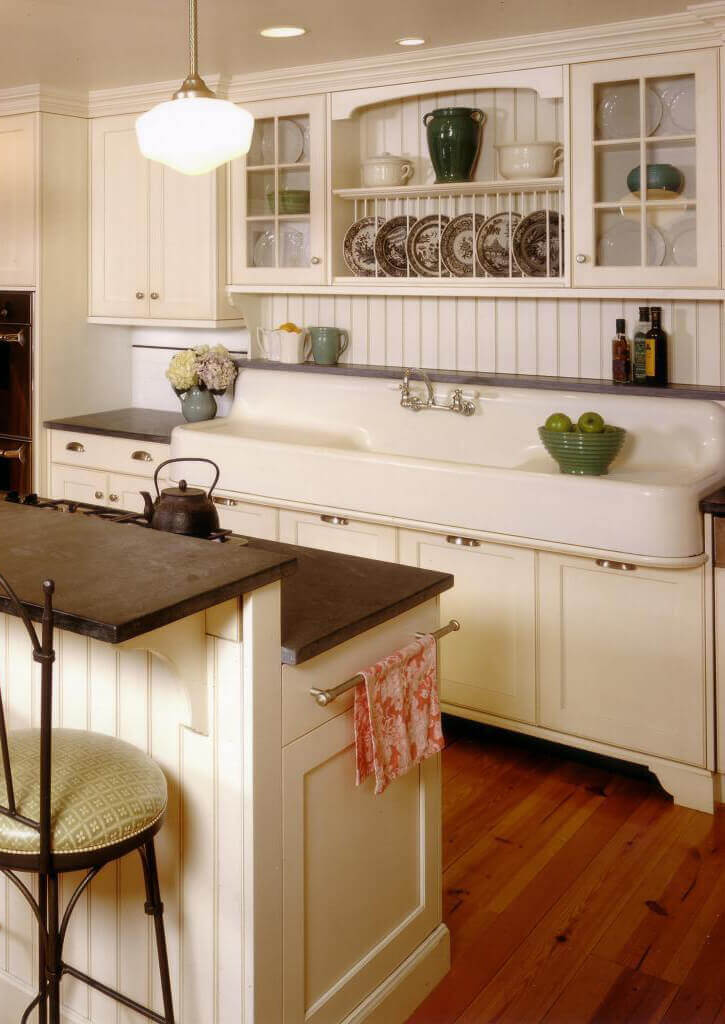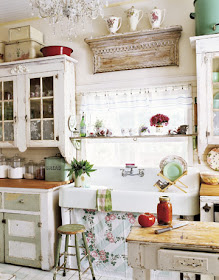The farmhouse sink, also known as an apron-front sink, has become a beloved fixture in kitchen design, adding a touch of rustic elegance and practicality to any space. With its distinctive exposed front panel and deep basin, the farmhouse sink evokes a sense of nostalgia while offering ample space for washing dishes, prepping food, and even bathing small pets. Incorporating a farmhouse sink into your kitchen design can transform the heart of your home into a cozy and inviting space.

Timeless Aesthetic Appeal
One of the most appealing aspects of a farmhouse sink is its timeless aesthetic. Originating from traditional farmhouse kitchens where practicality and durability were paramount, these sinks have transcended their rustic roots to become a sought-after design feature in both traditional and modern kitchens. The exposed front panel and deep basin evoke a sense of nostalgia and authenticity, adding character and charm to any kitchen space.
Moreover, farmhouse sinks come in a variety of materials, including fireclay, porcelain, stainless steel, and cast iron, allowing homeowners to choose a style that complements their kitchen decor and personal preferences. Whether you prefer a classic white fireclay sink for a traditional farmhouse look or a sleek stainless steel sink for a more modern vibe, there is a farmhouse sink option to suit every style and budget.

Versatility and Functionality
In addition to their aesthetic appeal, farmhouse sinks are highly functional and versatile. The deep basin provides ample space for washing large pots and pans, soaking dishes, and even bathing small children or pets. The apron-front design eliminates the countertop overhang found in traditional sinks, making it easier to reach and clean the sink area without straining or bending over.
Furthermore, farmhouse sinks can be installed in a variety of configurations to suit different kitchen layouts and design preferences. They can be under-mounted, flush-mounted, or even freestanding, allowing homeowners to customize the look and feel of their kitchen space. Whether you have a compact urban apartment or a spacious country estate, a farmhouse sink can be integrated seamlessly into your kitchen design for maximum functionality and style.

Durability and Ease of Maintenance
Another advantage of farmhouse sinks is their durability and ease of maintenance. Made from high-quality materials such as fireclay, porcelain, or stainless steel, farmhouse sinks are built to withstand the rigors of daily use and provide years of reliable service. Unlike traditional sinks with exposed edges that can chip or crack over time, farmhouse sinks feature a solid construction that is resistant to scratches, stains, and temperature fluctuations.
Moreover, farmhouse sinks are easy to clean and maintain, requiring only a mild detergent and water for regular upkeep. The non-porous surface of materials like fireclay and porcelain prevents bacteria and odors from penetrating the sink, ensuring a clean and hygienic environment for food preparation and dishwashing. With proper care and maintenance, a farmhouse sink can retain its beauty and functionality for generations to come.

Design Considerations and Installation
When incorporating a farmhouse sink into your kitchen design, there are several design considerations and installation factors to keep in mind. First and foremost, it’s essential to choose the right size and style of sink to fit your kitchen space and design aesthetic. Farmhouse sinks come in various sizes and configurations, so be sure to measure your cabinets and countertops carefully before making a selection.
Additionally, consider the surrounding cabinetry and countertop materials to ensure a cohesive look and seamless integration with the farmhouse sink. Depending on your preferences, you can opt for custom cabinetry with a built-in apron-front design or choose complementary materials and finishes to accentuate the sink’s rustic charm.
Installation of a farmhouse sink typically requires professional assistance due to its weight and size. Proper support and reinforcement of the cabinet structure are essential to prevent sagging or damage over time. Additionally, plumbing considerations such as drain placement and faucet compatibility should be addressed during the installation process to ensure optimal functionality and performance.

Common Mistakes to Avoid:
Choosing the Wrong Size: One common mistake is choosing a farmhouse sink that is either too large or too small for the kitchen space. It’s essential to measure the cabinets and countertops carefully and select a sink size that fits comfortably within the available space without overcrowding or underutilizing the area.
Overlooking Cabinet Support: Another mistake is overlooking the need for proper cabinet support and reinforcement during the installation of a farmhouse sink. The weight of the sink and water can put a strain on the cabinet structure, leading to sagging or damage over time. Ensuring adequate support and reinforcement will prevent these issues and prolong the lifespan of the sink.
Neglecting Plumbing Considerations: Neglecting to address plumbing considerations such as drain placement and faucet compatibility can lead to installation challenges and performance issues. It’s essential to work with a professional plumber to ensure that the plumbing infrastructure is properly configured to accommodate the farmhouse sink and any additional features.
Ignoring Maintenance Needs: Ignoring the maintenance needs of a farmhouse sink can result in stains, scratches, or damage to the surface over time. It’s crucial to follow manufacturer recommendations for cleaning and maintenance and avoid abrasive cleaners or tools that can scratch or dull the finish.

Can I install a garbage disposal with a farmhouse sink?
Yes, farmhouse sinks can accommodate garbage disposals like traditional sinks. However, it’s essential to ensure proper installation and compatibility with the sink’s design and plumbing configuration.
Are farmhouse sinks prone to staining or scratching?
Farmhouse sinks made from materials like fireclay or porcelain are resistant to staining and scratching when properly maintained. Avoiding abrasive cleaners and harsh chemicals can help preserve the sink’s finish and appearance.
Can farmhouse sinks be installed in existing cabinets?
Yes, farmhouse sinks can be installed in existing cabinets with proper support and reinforcement. However, it may require modifications to the cabinet structure to accommodate the sink’s size and weight.
What type of faucet is best for a farmhouse sink?
The best faucet for a farmhouse sink depends on personal preference and kitchen design. Options include traditional bridge faucets, single-handle faucets, or wall-mounted faucets, each offering different styles and functionalities.
Are farmhouse sinks suitable for modern kitchen designs?
Yes, farmhouse sinks can complement modern kitchen designs when paired with contemporary materials and finishes. Opting for sleek stainless steel or matte black finishes can give the farmhouse sink a modern edge while maintaining its rustic charm.

The Twice Remembered Cottage: Everything and the Kitchen Sink

Small Kitchen Bay Window Over Sink – bay window, faucet, furniture Kitchen window design

The Twice Remembered Cottage: Everything and the Kitchen Sink: Farmhouse Sink Inspiration Photos

The Twice Remembered Cottage: Everything and the Kitchen Sink: Farmhouse Sink Inspiration Photos

The Twice Remembered Cottage: Everything and the Kitchen Sink: Farmhouse Sink Inspiration Photos

Related Posts:
- DIY Kitchen Sink Cleaner
- Franke Kitchen Sink Fixing Clips
- White Kitchen Sink Waste
- Wall Mount Farmhouse Kitchen Sink
- Kitchen Sink Tap Replacement
- How To Unclog A Double Kitchen Sink With A Plunger
- Antique Cast Iron Kitchen Sink Faucets
- How To Clean My Kitchen Sink
- Elkay Stainless Kitchen Sink
- Double Corner Sinks For Kitchens